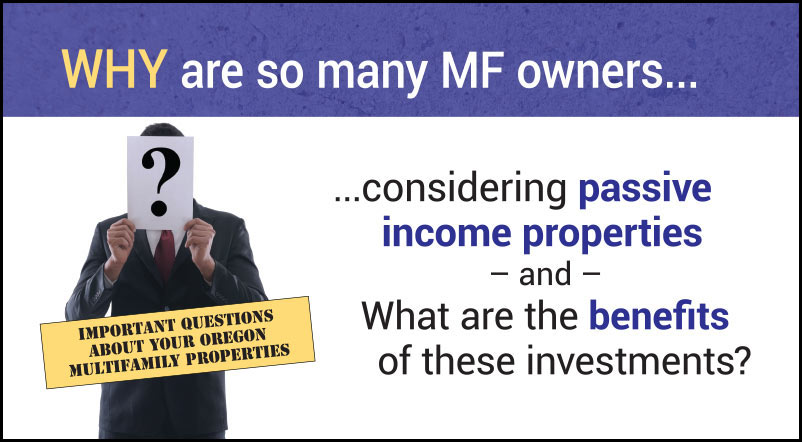
What Do You Know About Passive Income Properties?
We know commercial real estate, both multifamily and triple net passive investment properties. We know the plusses and minuses of each, and what kind of returns you can expect. It’s knowledge every savvy commercial real estate investor needs.
Listen or Read
Today we’re talking with René Nelson, CCIM, a well-known multi-family expert and commercial real estate broker about commercial real estate in Eugene. This special series focuses on issues related to multi-family properties that many investors aren’t as familiar with as they should be.
René, what are the benefits of passive income property?
René: Well, Patrick, we’re seeing an interesting trend right now. Many investors are starting to get cold feet on the multi-family market knowing that potential rent control and relocation fees could be passed next year by the legislation. So many are starting to ask themselves, “Is this really worth the risk?” And they’re starting to get out of the multi-family market while there’s pent up demand. There’s still people that are sitting on the sidelines with cash that want to buy multi-family, so a lot of investors are selling now and getting into passive real estate by doing a 1031 exchange.
The benefit of passive real estate is it’s typically a single-tenant building, like an AT&T store or a Verizon store, an Oil Can Henry’s or a 7-11 or a Dollar General Store. Most of these offerings come with a secure, long-term lease that’s typically corporately guaranteed on a national level by a triple-rated company that’s traded on Wall Street. You’ve got security, you’ve got proven income, and the tenant typically is responsible for the majority of the maintenance. So the multi-family owner that used to have to deal with tenants, toilets, and trash is now just getting a check in the mail and doesn’t have to deal with any headaches like they previously were dealing with.
So, René, how does passive income property compare to multi-family?
René: Well, we use a cap rate in commercial real estate to measure the value of a property. It’s used to measure the investor’s potential rate of return on their money. Multi-family cap rates in the Oregon area, Eugene’s a little different from Portland. Portland has really hot market right now, so they’re a smidge lower than, say, Eugene and locally in this area, and it really depends on the age of the property, the condition of the property, and how much passive income it’s creating. But the average cap rate right now for multi-family is around 5-1/2 to 6%.
Now if you compare that to a single tenant lease property, cap rates in the mid 5 range, 5 to 5-1/2, and they’re high demand because of the fact that the tenants do most of the work with being responsible for the maintenance of the property. And these properties have a tendency to hold their value longer, because you’ve got one solid tenant in that building as opposed to a bunch of tenants in a multi-family situation that are moving out and just kind of hard on the property overall. A single tenant situation, those buildings are more of a commercial nature, and so they hold value for much longer. And there’s a please recall hot demand right now for those type of single tenant opportunities.
Thank you, René. Now our listeners know what’s new with commercial real estate in Eugene right now. If you need more information, go to eugene-commercial.com or call René at 541-912-6583.

Recent Comments